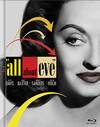





Shadow of a Doubt (1943)
Cast | Crew | Awards | Articles | Bibliography | Downloads | Links | Image Credits
| Article 2 |
Mr. Hitchcock Returns to FormThe Times (London), March 29, 1943 page 8Shadow of a Doubt-- This film sees Mr. Hitchcock at his best, and a good Hitchcock film is one of the greatest treats the cinema has to offer. In his last two or three films he had shown a disturbing tendency to substitute mechanical tricks for psychological subtlety as his means of building up an atmosphere of suspense, but here he succeeds, where in Suspicion he lamentably failed, and the attention of the audience is riveted as much on the nature of the characters as on the plot in which they are involved. The Newton family lives peacefully and uneventfully in California, and the domestic calm is pleasantly ruffled by the news that Emma Newton's brother is to visit them. To all of them it is a pleasant break in the daily round, but to Charlie (Miss Teresa Wright), a girl at the age when restlessness and dissatisfaction move into the blood, it means more. Uncle Charlie (Joseph Cotten) is gay, handsome, and rich; he represents a wider world and a freer way of living, but before long doubts begin to intrude. There is a man, wanted for what are known are the "Merry Widow" murders . . . Uncle Charlie has some strange habits . . . Two men posing as social survey officials turn out to be detectives . . . the shadow of a doubt looms larger and more substantial until at last young Charlie knows, and, in knowing, stands in danger of her life. All the time, Mr. Hitchcock has been content to hint, and he has in his camera and sound-track allies cunning in the art of suggestion. The presence of Mr. Cotten, one of the Mercury players, stresses the resemblance of the film's methods to those of Orson Welles, but it would not be fair to make too much of this -- the core of the film's excellence is Mr. Hitchcock's own. The end is neat and ironical, but not too artificially so, and Shadow of a Doubt will long stay in the mind as a film of tense and cumulative interest. © 1943 The Times |
|
Article 1 | Article
2 |
| Now in Print! |
|---|
| Now on DVD! |
|---|
Buy Videos & DVDs |
|
Buy Movie Posters |
|
Buy Movie Posters |
|
Classic
Movie Merchandise |
|
![]() Printer-friendly version.
Printer-friendly version.
![]() Return
to the top.
Return
to the top.
Last updated:
March 10, 2011.
Reel Classics is a registered trademark of Reel Classics, L.L.C.
© 1997-2011 Reel Classics, L.L.C. All rights reserved. No
copyright is claimed on non-original or licensed material.
Terms of
Use.









